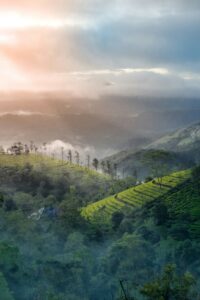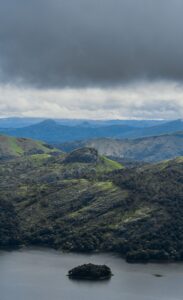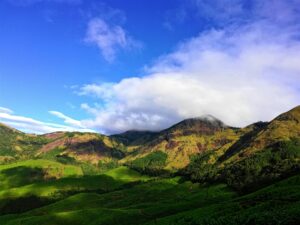Nestled in the heart of Kerala, Idukki is a district celebrated for its stunning landscapes, diverse culture, and intriguing place names that often hold captivating stories and meanings. Join me as we explore some of the most interesting place names in Idukki, each with its unique charm and significance.
Munnar
Munnar, one of India’s most beloved hill stations, derives its name from the Tamil words “Munnu” (three) and “Aru” (river), referring to the confluence of three rivers: Mudhirapuzha, Nallathanni, and Kundala. Known for its sprawling tea gardens, misty hills, and pleasant climate, Munnar is a paradise for nature lovers and adventure seekers alike.

Thekkady
Thekkady, home to the Periyar Wildlife Sanctuary, boasts the name “Thekkady,” originating from “thekku,” which means teak. This name harks back to the time when the region was densely populated with teak forests. Thekkady is now synonymous with wildlife adventures and the tranquil Periyar Lake.
Idukki
The name “Idukki” is believed to be derived from the Malayalam word “idukku,” meaning a narrow gorge, reflecting the district’s rugged terrain. The Idukki Dam, one of the highest arch dams in Asia, stands as a testament to the region’s natural and engineering marvels.
Kattappana
Kattappana, a bustling town known for its spice and rubber plantations, possibly derives its name from “Kattu” (forest) and “Pana” (a type of tree). This reflects the area’s transformation from dense forests to fertile agricultural land.
Thodupuzha
Thodupuzha, a major town and municipality, gets its name from “Thodu” (stream) and “Puzha” (river), highlighting the numerous water bodies in the area. This lush, green region is a hub for agriculture and natural beauty.

Kumily
Kumily, located near Thekkady, is a prominent spice trading center. The name “Kumily” is believed to come from “Kumal,” meaning barren land, indicating the area’s transformation into a fertile trading hub.
Vagamon
Vagamon, a picturesque hill station, is renowned for its meadows, pine forests, and misty landscapes. The name “Vagamon” combines “Vaka” (flower) and “Mudi” (hill), suggesting the floral beauty that adorns its hills.
Peermade
Peermade, meaning “hill of the Peer” in Malayalam, is named after Peer Mohammad, a Sufi saint. This serene hill station is known for its tea, coffee, and cardamom plantations, along with its cool, refreshing climate.
Ramakkalmedu
Ramakkalmedu, known for its panoramic views and strong winds, derives its name from “Rama” (Lord Rama) and “Kal” (rock). Legend has it that Lord Rama set foot on this rock during his search for Sita, giving this place its divine association.

Devikulam
Devikulam, translating to “the pond of the goddess,” is a serene hill station with a sacred history. Legend says Goddess Sita bathed in the waters of Devikulam lake, which is now surrounded by tea plantations and a cool climate.
Marayoor
Marayoor is famous for its natural sandalwood forests and ancient dolmens. The name “Marayoor” comes from “Mara” (hidden) and “Ooru” (village), indicating a hidden village. This area is also known for its traditional jaggery making and sugarcane farms.
Pallivasal
Pallivasal, known for its hydroelectric power plant, the first in Kerala, gets its name from the Malayalam word for a place of worship. This name signifies the spiritual and natural significance of the area.
Anakkara
Anakkara, located near Kumily, is renowned for its spice gardens. The name “Anakkara” can be broken down into “Ana” (elephant) and “Kara” (land), suggesting that the area was once frequented by elephants.
Nedumkandam
Nedumkandam, a major agricultural hub, gets its name from “Nedum” (long) and “Kandam” (plot of land), reflecting the large expanses of agricultural land in the area. It is particularly known for its pepper and cardamom plantations.
Poonjar
Poonjar is a historical town with a rich legacy of the Poonjar royal family. The name “Poonjar” might be derived from “Pon” (gold) and “Ar” (river), indicating a prosperous land. This area is steeped in history and tradition.

Idukki’s place names offer a fascinating glimpse into the district’s rich heritage, natural beauty, and cultural diversity. Each name tells a story, reflecting the transformation and history of the region. Whether it’s the misty hills of Munnar or the sacred waters of Devikulam, Idukki is a treasure trove of intriguing stories waiting to be discovered.
By exploring these unique place names, we not only learn about the linguistic and historical roots of the region but also get inspired to visit and experience the beauty and diversity that Idukki has to offer. So pack your bags, set your itinerary, and get ready to uncover the wonders of Idukki!

I can help you find the finest deals, perfect for you.